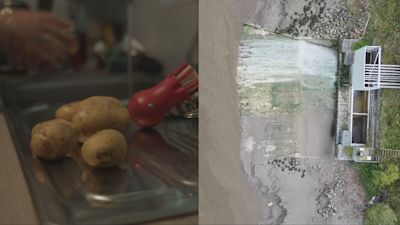Residents near chemical factory told to wash and peel homegrown vegetables

An investigation seen by ITV News reveals how much of a cancer-causing chemical has been released from a factory on the Lancashire coast, as our Science Correspondent Martin Stew reports.
A site of special scientific interest, the River Wyre, flows into Morecambe Bay - but what flows into the river itself?
On its banks sits a factory that has produced PFAs (Perfluoroalkyl and Polyfluoroalkyl Substances), so-called forever chemicals, since 1950. They’re complex compounds found in things like nonstick pans which are great at being waterproof and lubricating, but last thousands of years and some can damage our health.
One of them, called PFOA, was rated last year as a group 1 carcinogen - or in other words, it causes cancer in humans. It’s now banned in the UK.
Data shared with ITV News by Watershed Investigations shows that between 1950 and 2012 nearly 115 tonnes of the chemicals were released into the river, nearby landfill and air.
Emissions have cut right back, but as recently as last year Leana Hosea from Watershed Investigations still found some leaching into the river.
“The highest level we found was 250 times the legal level you’re allowed for drinking water. Obviously, you’re not drinking this but they’re called forever chemicals for a reason because they last for thousands of years.
"There’s no suggestion that AGC the chemical company have done anything illegal they say they follow all environmental standards and argue that any new emissions are a result of historical contamination over a hundred years slowly working its way into the environment.”
Wyre Council is worried enough about levels of contamination in the soil - it’s drafted in the environment agency to investigate potential health risks. They’re also advising people to wash and peel vegetables grown in the nearby area.
Professor Patrick Byrne is an expert in forever chemicals. He’s been monitoring the site.
“The actual long-term effects for human health and wildlife we just don’t know,” he told me.
“It’s really hard to link contamination and human health, that’s what the investigation is for, but it’s really difficult to link in an area like this in a local population there’s a lot of factors at play that drive increases in the incidences of cancer.”
On Wednesday evening the council will hold the first of several public meetings to address growing local fears.
Subscribe free to our weekly newsletter for exclusive and original coverage from ITV News. Direct to your inbox every Friday morning.
Want a quick and expert briefing on the biggest news stories? Listen to our latest podcasts to find out What You Need To Know...